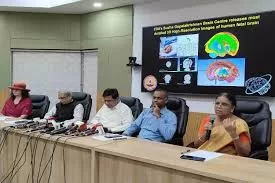Ten weeks into the war in Ukraine, UN humanitarians on Friday said that they were urgently ramping up efforts to provide vulnerable children with specialist and psychosocial support, amid “tremendous” mental health needs and ongoing dangers linked to the Russian invasion and sexual and gender-based violence.
“We’re anticipating numbers in terms of all forms of violence against children to be in the tens of thousands for sure,” said Aaron Greenberg, UNICEF’s regional child protection advisor for Europe & Central Asia.
Plight of thousands
Before 24 February, Ukraine’s orphanages, boarding schools and other institutions for youngsters, housed more than 91,000 children, around half with disabilities.
Today, only around one-third of that number have returned home, including those evacuated from the east and south, according to UN Children’s Fund UNICEF.
“The impact of the war on these children has been particularly devastating,” said Mr. Greenberg, speaking to journalists in Geneva via Zoom from Lviv. “Tens of thousands of children living in institutional or foster care have been returned to families, many of them hastily, as the war got started. Many have not received the care and protection they require, especially children with disabilities.”
‘Bouncing back’
Condemning the fact that hundreds of youngsters have been killed in shelling attacks already, the UN agency warned that others had suffered serious mental health trauma linked to “direct experience” of violence, both physical and sexual.
While insisting that many children “will bounce back” if they can get back to school and start seeing some form of “normalisation” in their lives, Mr. Greenberg insisted that it was more important than ever to ensure that Ukraine’s social service workforce was reassured and encouraged to stay and help.
He noted too that “a smaller, but important number” would likely develop post-traumatic stress disorder between two and four months after they were traumatised.
“Since 24 February UNICEF and our partners have reached over 140,000 children and their caregivers with mental health and psychosocial services,” he continued. “But a vast majority of that, 95 per cent, are direct engagements with children and trained psychologists.”
Problems mount
Priorities for the UN agency include scaling up investments in local NGO mental health providers to help the youngsters still in care, in support of Ukrainian government policy.
But it is not straightforward finding enough professionals to help, “as social workers, child psychologists and other professionals are equally impacted by this conflict”, Mr. Greenberg continued.
“If you start doing the math, there are children who remain in institutions who were not evacuated either internally or externally, and there are children in foster care families whose payments were temporarily interrupted, and there are children in guardianship arrangements, a significant number, so when you layer this, the number of children in need who were vulnerable pre-crisis and whose now vulnerabilities have been accelerated, is incredibly high.”
Throughout Ukraine, UNICEF has 56 deployed mobile units to provide specialised health services to traumatised children. There are also 12 “dedicated violence mobile teams in the east”, where fighting is ongoing, Mr. Greenberg said. “To date, those mobile teams in the east have worked with 7,000 cases of women and children in terms of responding to specific violence-related queries and reports that the mobile team then follows up on.”
UN aid appeal to keep lifesaving postal system running
Ukraine’s postal system has become a lifeline for aid deliveries for many in need around the country, and on Friday, the UN agency that supports mail operations worldwide, the Universal Postal Union (UPU), launched an appeal for extra funding.
Member countries are being invited to send contributions that will benefit Ukraine’s mail service, the Ukrposhta, through the UPU’s Quality of Service Fund.
“Solidarity is a founding principle of the UPU. Our colleagues at Ukrposhta have called for our help and we must answer to ensure people and communities continue to receive humanitarian aid and other essential services offered by the Post,” said UPU Director General Masahiko Metoki.
“I therefore appeal to our postal family to support our colleagues in Ukraine by any means possible, including through this new avenue.”
Ukrposhta has continued to deliver humanitarian aid, pension payments and postal items throughout the conflict, despite loss of life and injuries to postal staff, as well as damage to the Post’s property and infrastructure, the service said in a press release on Friday.
Contributions through the Quality of Service Fund (QSF) will help support the reconstruction of postal infrastructure and restoration of postal services in conjunction with the UPU’s Emergency and Solidarity Fund (ESF).







![Interim recommendations for use of the ChAdOx1-S [recombinant] vaccine against COVID-19 (AstraZeneca COVID-19 vaccine AZD1222 Vaxzevria™, SII COVISHIELD™)](https://healthandfamily.in/wp-content/uploads/2021/07/1-23.jpeg)






